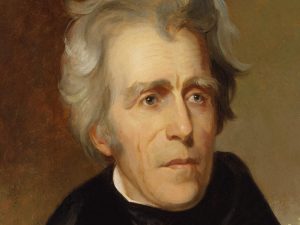TTP: MEET THE FIRST PRESIDENT TRUMP
I believe we’ve seen a US president similar to Donald Trump before. Allow me to introduce you to Andrew Jackson, seventh President of the United States. Other commentators have made the point, too. My arrival at this conclusion was done independently, after thinking through the histories of 44 American presidents.
Jackson and Trump share several key qualities as leaders and as President-Elects. I’ll tick off a few.
- Both are men of wealth—Trump heralded from a somewhat wealthy upbringing but added substantially to his wealth through his own efforts; Jackson was self-made after coming from a poor home and having lost both parents at an early age.
- Both men relish action and results—Trump and Jackson alike prefer doing to thinking or contemplating.
- Both regard themselves as outsiders and challengers to a status quo—they view the American political system as stifled by people of inherited wealth and privilege (despite, again, that both of them are wealthy at the time of entering the presidency).
- Both possess, and enjoy possessing, a quality best described as “maverick”—they ride the edge and border of conventionality—for Jackson, such a maverick status occurs in the military; for Trump it occurs, in business.
- Both embrace the claim that the existing American political system is “corrupt.”
- Both attract followers who may be at odds with a particular set of behavior, habits, and manners associated with people of established means and routines of power.
- Both have very strong feelings toward groups they have labeled as threats and dangers toward American security and a defined American way of life.
- Both see themselves as defenders of national honor which is liable to assault and attack by enemies.
- Both believe that have come to embody a popular movement aimed at returning the “common” man and woman to their rightful place at the center of the American way of life.
- Both tend to view conflict through a highly personal perspective—in their eyes an opponent can quickly become an enemy and grudges can be carried for a long time.
- Both tend to define relationships through equally highly personal perspective—insults can be the fuel for conflict while praise can be the foundation for harmony.
- And, weirdly, both have recent family roots traceable to the British Isles, especially Ireland.
Quite a list, don’t you think?
Now, before you assign a conclusion to me that doesn’t belong, let me assure you of one thing. I don’t for a second think that they are identical leaders in identical situations. Not at all. A quick example is this: Jackson spent part of his youth fighting in the War of the American Revolution. The experience left deep, life-changing scars. Trump didn’t serve in the military and didn’t have a public cause or event as meaningful as the Revolution was for Jackson.
The more intriguing point, however, is that they share so much across a span of almost two centuries. Because of this linkage, I suggest to you that Andrew Jackson holds key takeaways for understanding President Donald Trump. We’ll explore those next.
First, Jackson’s dominant style and personality carried over to his two terms in the White House. He didn’t stop being who he was. He was ferociously personal, decisive, action-oriented, and convinced that he was the Champion-Protector of the American Common Man and Woman.
Second, many of Jackson’s most important moments in the White House were when he lashed, slashed, and smashed those things he viewed as threats to the popular movement which he led. The effects and consequences of these moments were mixed. They weren’t all wonderful and they weren’t all horrible.
Third, Jackson had some surprising tendencies as President. At times, he surprised his critics and opponents. Where he was assumed to be a largely localistic or regionally-based leader, he proved to be larger in scope and vision (e.g. American nationalist). Where he was feared to be authoritative and autocratic, he delegated to strong subordinates (e.g. General Winfield Scott as South Carolina verged on the edge of civil war). Where he was assumed to be quick to resort to war and violence, he adopted calmer approaches (e.g. US-British relations).
Andrew Jackson became the central figure in not only a new version of the Democratic Party but also a popular political and social movement known as Jacksonianism. Jackson helps us to better understand the potential results of a Donald Trump Presidency.
Action-Point: You likely have in your mind those things that Donald Trump has done which you expect he will repeat in the White House. The bigger point, it seems to me, is how you will interpret those things which will prove to be surprising and unexpected. The power and force for any potential “Trumpianism” lies with ability of the predicted and unpredicted to stamp a lasting imprint
Next time on The Trump Project: The Trump Rule–what it is and what it means.








